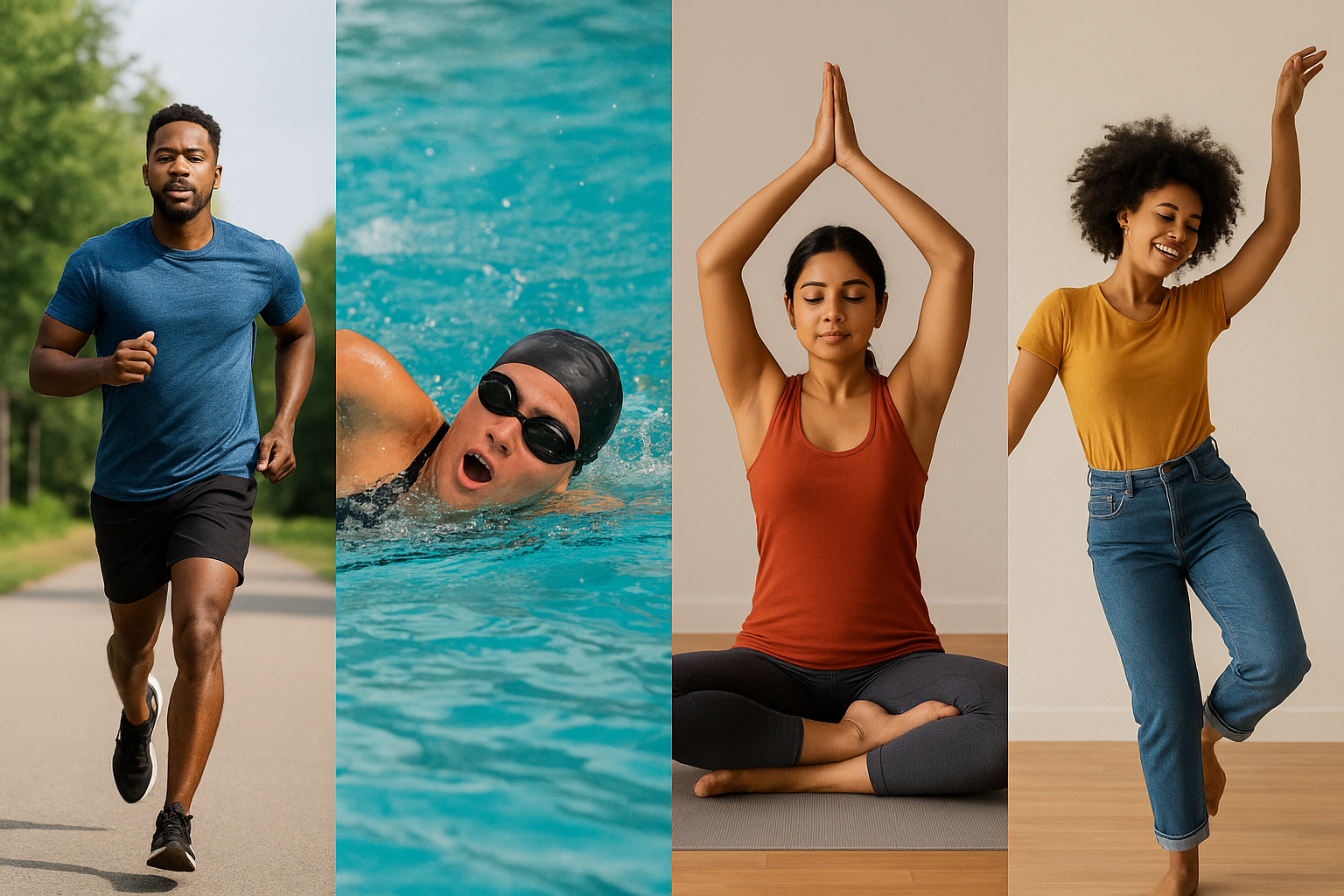Why Exercise Is One of the Best Natural Stress Relievers
Stress is a natural response to challenges — but when it becomes chronic, it can disrupt sleep, increase blood pressure, and weaken the immune system. According to the American Psychological Association, around 77% of adults report physical symptoms of stress, including fatigue and headaches.
One of the most effective and proven ways to reduce these effects is regular physical activity. Exercise releases endorphins — the brain’s “feel-good” chemicals — and helps lower cortisol, the stress hormone. In a 2020 study published in the Journal of Behavioral Medicine, adults who exercised for at least 30 minutes five times a week experienced a 25% reduction in cortisol levels compared to inactive participants.
1. Walking: Simple but Powerful
Walking may seem ordinary, but it’s one of the most accessible and effective stress relievers. A brisk 30-minute walk helps clear the mind, regulate breathing, and release tension.
Tip: Try walking outdoors — especially in green areas or near water. Studies from Harvard Health Publishing show that walking in nature enhances the calming effects of exercise, lowering anxiety and improving mood more than indoor walks.
- Duration: 30 minutes
- Frequency: 5 days per week
- Add-on: Listen to calming music or practice mindful breathing during your walk.
2. Yoga: Mind and Body Connection
Yoga combines movement, breath, and mindfulness, making it a complete stress-management practice. A 2019 meta-analysis found that yoga reduced anxiety and stress levels in more than 80% of participants.
Why it works:
- Deep breathing calms the nervous system.
- Stretching releases physical tension.
- Meditation reduces mental noise.
Routine to try: Start with beginner-friendly sessions (10–15 minutes) focused on slow flow and relaxation — for example, Child’s Pose, Cat-Cow, and Legs Up the Wall.
3. Strength Training: Build Resilience
Lifting weights or using resistance bands doesn’t just strengthen muscles — it strengthens your mind’s ability to handle pressure. Research from the Journal of Strength and Conditioning Research suggests that regular strength training improves mood and reduces perceived stress.
- 2–3 sessions per week
- Focus on large muscle groups: squats, lunges, push-ups, planks
- Keep moderate intensity — the goal is consistency, not exhaustion
4. Running or Jogging: The Endorphin Boost
Running triggers what many call the “runner’s high” — a wave of euphoria and calm that follows sustained effort. It’s caused by the release of endorphins and endocannabinoids, natural chemicals that elevate mood and reduce pain.
Tip: If you’re new to running, alternate 1 minute of jogging with 2 minutes of walking for 20 minutes. Gradually increase running intervals each week.
5. Dancing: Stress Relief with Joy
Dancing adds emotion and fun to movement. It improves coordination, cardiovascular health, and releases emotional tension. A study from the Arts & Health Journal found that people who danced regularly had significantly lower stress levels and higher self-esteem.
Routine to try: Put on your favorite upbeat playlist and dance for 15–20 minutes — alone, with friends, or in an online class.
6. Swimming: Calm for the Body and Mind
The gentle pressure of water has a massaging and meditative effect on the body. Swimming improves breathing control and helps slow down the heart rate. Even floating or light aqua-aerobics can reduce anxiety and muscle tension.
- Duration: 20–30 minutes
- Frequency: 3 times per week
- Focus: Smooth, rhythmic strokes and steady breathing
7. Stretching and Mobility Work
Stretching improves circulation and helps release accumulated tension from long hours sitting or working. It’s an excellent practice before bed or after work to transition from “alert” to “relaxed” mode.
Routine to try: Spend 10 minutes stretching shoulders, neck, back, and legs. Pair movements with slow breathing (inhale = stretch, exhale = release).
8. Group Sports: Connection Reduces Stress
Social connection itself reduces stress hormones. Playing soccer, tennis, volleyball, or joining a group fitness class helps you move while building a sense of belonging.
- Physical activity + social bonding = stronger emotional resilience
- Shared laughter and teamwork increase dopamine and serotonin
Final Thoughts
Incorporating physical activity into your routine doesn’t have to be complicated — what matters is consistency and enjoyment. Whether it’s walking in nature, dancing at home, or practicing yoga, movement helps restore balance between body and mind.
Start small today: Pick one activity you enjoy, set a 10-minute timer, and move. Your mind — and your body — will thank you.
References
- American Psychological Association (2023) – Stress in America™ Survey
- Harvard Health Publishing – Exercise for stress and anxiety
- Journal of Behavioral Medicine (2020) – Effects of Regular Exercise on Cortisol
- Journal of Strength and Conditioning Research (2019)
- Arts & Health Journal (2021)
Disclaimer: This article is for informational purposes only and does not replace professional medical or mental health advice.
About the Author
Sabrina Montes is a wellness content creator passionate about mindfulness, stress management, and healthy living. Through MeAcalme.com, she shares practical, research-based strategies to help readers live calmer, healthier lives.
